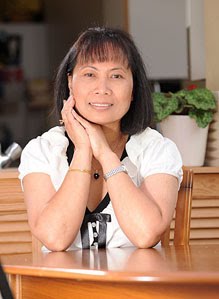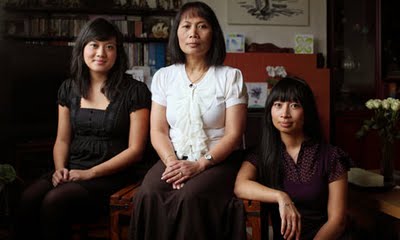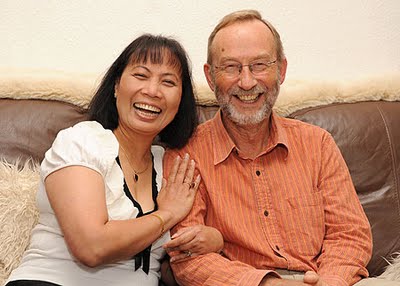Somaly's story pt 2
Until very recently, Somaly had not spoken to anyone about her experiences in Cambodia. Even with her husband, Borithy, who is also a Cambodian, she left the past buried in silence. She met Borithy in Phnom Penh, where she headed after the reunion with her remaining family. With her schoolgirl English, she found work in a hotel, liaising with the foreign aid workers who had begun to arrive. Among them was Marcus Thompson, a 34-year-old Englishman working for Oxfam, who would later extend another vital helping hand to lift her clear of a human swamp. The onetime privileged son of magistrates, Borithy fell immediately in love with the 20-year-old Somaly. But she was not easily wooed. Thinking him a playboy, she was suspicious of his intentions. "I wasn't in love with him," she says now, sounding at once proud and coy. "He tried to court me all the time and I was never interested. Because he's good-looking, so intelligent, and because of his background, he had so many girls after him. I thought, he'd never keep me. Why me? There are much more pretty girls than me. And I certainly do not want to be one of his conquests!" It was only after Borithy told Somaly his own terrible story that she lowered her defences. She learned that he had lost both his parents to the Khmer Rouge, as well as his youngest brother. One sister died of starvation in his arms and the other was tied to a pole and left to die in the heat of the sun. "He had to cut her down at night. It was her last breath." When Borithy discovered that his life was in jeopardy in Phnom Penh, he told Somaly that he had to leave, but he wouldn't go without her. So in March 1980 they married inside a wrecked pagoda and fled the next day to the Thai border. Once more they both faced enormous risk. "There were Khmer Rouge," Somaly explains, "Khmer bandits, Thai bandits, Thai soldiers, who would shoot at anyone trying to cross, and minefields."
Nevertheless, they got through and stayed at a refugee camp with thousands of other Cambodians. It was there that she ran into Marcus Thompson again. The aid worker was so astounded by the conditions in which they were living, trapped near the border, unable to go on or go back, that, with the backing of Oxfam, he applied for asylum on their behalf. Much to everyone's surprise, the British authorities granted entry to Somaly and Borithy, and shortly afterwards, her mother, brother and sister. When they arrived in England, in May 1981, they made a commitment never to look back on what had happened. Instead they would put all their energy into building a new life, not least because they had created a new life. Somaly was pregnant with her first child, Mary Thida. "For the first 10 years I was here," she says, "I was just blocking it out. Not mentioning it. Both of us. We both had nightmares. We both woke up in sweat sometimes. But we never talked about it. We didn't want to."
They lived in a convent in Brighton initially, and then moved to Witney, where Somaly, who had learned English as a schoolgirl, found it hard to comprehend the language. "I thought, my goodness why can't I understand my neighbours? Because they were all Scottish and Irish! It was so surreal. I just kept saying, 'Pardon? Pardon?' But my neighbours were wonderful." She also had to adjust to a cool climate. Yet as much as she missed the tropical heat, she found cold, damp England to be a kind of bliss. "Because you don't go to bed at night and worry about whether you're still going to be here in the morning," she says.
In 1986, she had a second daughter, Bophanie. "Best of all were the girls," she says, flushed with motherly love. "They were our future. We would make sure they'd never go through what we went through. They were born free. All I had since the age of 10 was war, hatred, killing. To come here and see peace and tranquillity and people just getting on with their life…" she trails off, as if there were nothing more that needed to be said. In the current debate on asylum seekers, the extraordinary efforts some people make to improve their circumstances are often underestimated or overlooked. But Somaly and Borithy were never simply economic migrants in search of a better standard of living – they wanted a better life. And they laboured hard to get it. While Borithy studied English at Oxford Brookes University, Somaly did whatever work she could find, taking in sewing at home, and working part-time in shops. Then in 1994, Borithy returned to Cambodia to work with landmine victims. He has remained there, working to reconstruct the country, ever since. He now heads up a consortium of Cambodian NGOs. The family have had to make do with annual visits, but effectively Somaly has brought up the two girls on her own. She deliberately concealed her story from her children, hiding books about Cambodia and keeping her history safely out of sight. She and her mother, who died eight years ago, never told the girls what had happened to their family. "I didn't want them to be burdened by their past," she says.
What she wanted for her children was a normal childhood, the very thing that she was so cruelly denied. "It's almost as if I lived through them," she says. "It's very important to me that they enjoy their lives." As it turned out, Mary went on to study PPE at Oxford, while Bophanie read English at Bristol. A bright, sensitive and self-possessed 27-year-old, Mary is now assistant private secretary to Gareth Thomas, minister of state at the Department for International Development. When I meet her at the ministry, she admits that she's long been curious about her family background. But she's never asked her parents directly, "because," she says, "it just seems too painful and it never seems to be the right time to sit down and say, 'So what happened to you?'"
Mary has spent a lot of time reading about what took place in Cambodia and also about other atrocities around the globe. In fact, it's become her professional area of interest. As part of her work with International Development, she has spent nine months in Iraq, helping with its first democratic election, and extended periods in Sudan. Somaly had told me those nine months that Mary was in Iraq were the longest of her life, which, considering some of the months she has lived through, is a testament to the depths of maternal anxiety. "When I got back from Iraq," says Mary, "Mum said that I'd aged her 10 years."
That begs the question: how much must Somaly's own mother have aged from maternal anxiety, quite apart from her own physical hardship? "My grandmother lost six children and her husband," says Mary, "and yet, in a similar way to my mum, she was always very gentle and generous, and so good-natured that you'd never have any sense of what she'd gone through. She was very positive about her life in the UK. She learnt English through talking to her grandchildren and watching television." It's this attitude that has proved an inspiration for Mary. She could have simply enjoyed the fruits of the comfortable life that a gifted student might expect. Yet instead she has chosen to seek out the world's troubled spots and attempt to provide constructive help.
"I wanted to give something back because my sister and I have been very lucky," she says. "I think you get that a lot with second-generation refugee children: they feel they owe something." Mary is not without reservations about foreign intervention, but, perhaps informed by her knowledge of what happened in Cambodia when the world looked away, she doesn't think that inaction is the answer. "I realise that the involvement of the international community is flawed and there's an awful lot of politicking around it," she explains, with the careful phrasing of a civil servant, "but what if there was no involvement at all? When I was in Iraq, I certainly felt that on balance it was better that we were there than not there." I ask her what effect her parents' lives have had on her own choices. She thinks carefully for a while before responding. "A lot of what I do is not necessarily to seek approval or make them proud but to show them that I'm making the most of the opportunities they've given me, and that I don't take for granted that they made it and we're all here alive. My mum always says that everything else is a bonus. All she wanted was us to be safe and healthy."
The story of the Luns is a global story, and a historical one. It stretches from the jungles of Cambodia to the deserts of Sudan, and from the chaos of Baghdad to the tranquil order of Oxfordshire. It also descends generations, gradually revealing itself as the trauma subsides, providing the catharsis, if not closure, of disclosure. Thirty years on and Cambodia continues to be a country with enormous problems, though nothing to compare with the Pol Pot era. All manner of injustices remain neglected or covered up, and its continuing poverty has recently led to Oxfam returning to the country, to provide emergency relief to combat flooding. The Luns' plight cannot address those issues. Instead it articulates something deeper and more uplifting in the human spirit. The Luns are a family of survivors. To appreciate the full richness of life, and everything they so nearly lost, is the survivor's reward. But to want to contribute so much themselves, that's a very rare personal gift.
Labels: Somaly Lun




